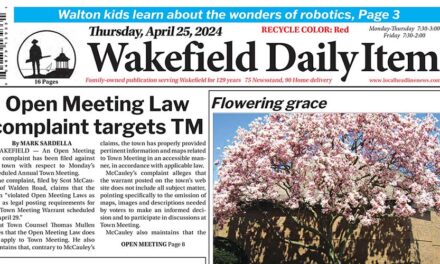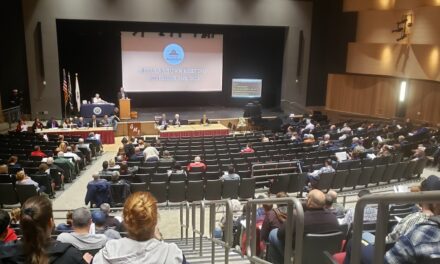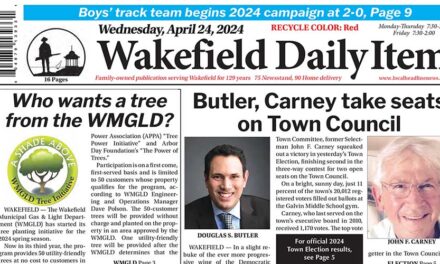Published in the October 15, 2015 edition.
By MARK SARDELLA
WAKEFIELD — Town Counsel Thomas Mullen has investigated the Open Meeting Law complaint filed against the School Committee last summer by Daniel Lieber of 1 Elm St. and concluded that the School Committee improperly discussed the possibility of promoting Dr. Kim Smith to Superintendent in executive session at its June 3 meeting.
Mullen has reported his findings to Massachusetts Attorney General’s office.
In a complaint filed Aug. 7 on the Attorney General’s “Open Meeting Law Complaint Form,” Lieber alleged that the School Committee violated the Open Meeting Law at its June 3 meeting when it “convened in executive session and intentionally discussed topics improper for executive session regarding potential hiring options for a Superintendent and professional qualifications of Dr. Kim Smith.”
Lieber further maintained that the executive session was not properly called in that no declaration of the executive session topics was announced and no reason was given as to why it would be detrimental to hold the discussion in open session.
Mullen told the Item in September that the way Open Meeting Law complaints are handled is for the written complaint to be first filed with the board or committee that is supposed to have violated the Open Meeting Law. That board or committee then either deals with the matter itself or refers it to Town Counsel. (The School Committee referred Lieber’s complaint to Mullen at its Sept. 22 meeting.)
Town Counsel then conducts an investigation and reports his findings to the Massachusetts Attorney General’s Office and to the complainant, in this case Lieber. If the complainant is satisfied with Town Counsel’s conclusions regarding the complaint, no further action will be taken. If the complainant is not satisfied, the Attorney General’s Office may investigate further.
Mullen’s Oct. 10 letter reporting the findings of his investigation to the Office of the Attorney General is cc’d to Lieber, School Committee Chairman Kate Morgan and Town Administrator Stephen P. Maio.
Mullen first addresses the timeliness of the complaint. He notes that while the complaint was filed more than 30 days after the June 3 meeting, the complaint was still filed in a timely manner because Lieber could not have known that a violation had occurred until the executive session minutes were “declassified” weeks after the meeting.
Mullen’s letter notes that the first meeting posting on June 1 was inadequate because it said only there would be an “Executive Session to discuss a personnel matter.”
There is “no general right,” Mullen notes, “to go into executive session to discuss ‘personnel matters.’” The second and third postings were made after the School Committee Chair consulted with Town Counsel, Mullen states. The third posting, on the day of the meeting, got it right, Mullen says. It described “a possible executive session to discuss strategy with regards to non-union personnel negotiations with the Superintendent and Asst. Superintendent.”
Mullen says that he and Morgan jointly concluded that postponing the meeting in order to comply with the 48-hour advance posting rule was not feasible because the abrupt and unexpected resignation of former Superintendent Dr. Stephen Zrike demanded immediate School Committee action.
Mullen concludes that the draft minutes of the June 3 meeting “reflect what happened in both open and executive session.” While he sees no harm in consolidating the open session and executive session minutes since they have been “declassified,” he urged the School committee to keep separate minutes for executive sessions going forward in order to be in strict compliance with the Open Meeting Law.
Mullen found that contrary to Lieber’s complaint, the motion to go into executive session was appropriately made. However, he notes that the minutes do not reflect whether the chairman announced that open session would reconvene after the executive session. Under the Open Meeting Law, such an announcement should have been made, Mullen says.
The discussion in executive session, as reflected in the minutes, strayed from the stated purpose, Mullen says, as the minutes “do not reflect any genuine strategizing,” but rather relate to the merits of elevating the Assistant Superintendent to the position suddenly vacated by the Superintendent. That discussion, Mullen stresses, should have taken place in open session.
In terms of remedies, Mullen notes that he met at length with the School Committee on Aug. 11 to go over the Open Meeting Law and members “expressed a genuine desire to improve their compliance with the law.”
Mullen had several more recommendations for the School Committee.
He suggested that the School Committee “immediately take up Open Meeting Law complaints in open session and delegate them to me (or take other such action as the committee may wish).”
Mullen recommends that the Chairman consult with him in advance of any meeting likely to include an executive session so that the properly worded posting can be made in the required 48 hours prior to the meeting.
Town Counsel also recommended that the Chair announce before going into executive session whether or not open session will resume after the executive session.
Mullen concludes that the School committee should have held all of its discussions concerning the merits of promoting the Assistant Superintendent in open session and should not have discussed it at all in executive session.
Lieber reacted to Mullen’s findings yesterday.
He stressed that he had no issue whatsoever with the selection of Dr. Kim Smith as Superintendent of Schools, calling Smith “a very good Superintendent.”
However, he said that the act of selecting a superintendent is the most important task that the School Committee performs.
“It is important to actually witness the entirety of the deliberations and know where our representatives stand and what their priorities are, based on what they say,” Lieber observed.
The issue, Lieber said, “is about the committee limiting the press and the public from seeing their collective deliberations about how to approach the most important decision they will make this year.”
Lieber felt that Mullen had substantiated that all of the issues in the complaint were legitimate. He said that it was “disconcerting” that these violations had occurred since the School Committee had been warned about violations before and six of the seven members certified in writing that they understood the Open Meeting Law.
Lieber said that he did not know if any further action would be warranted “until we see what the School Committee will will do in response to [Mullen’s] letter.”
School Committee Chairman Kate Morgan also reacted yesterday to Mullen’s letter.
“The issue of the superintendent’s departure was time sensitive and needed to be handled with urgency,” Morgan said. “I turned to Attorney Mullen for his expertise several times during the first weeks of June for advice on the matter and I would like to thank him for ensuring our meetings were posted properly and we entered into executive session in full compliance with the law. We have reviewed the points of the complaint and have taken immediate corrective actions where applicable. Now that this complaint has been addressed appropriately the committee is happy to be continuing with our focus on moving the district forward in the most positive ways possible.”




